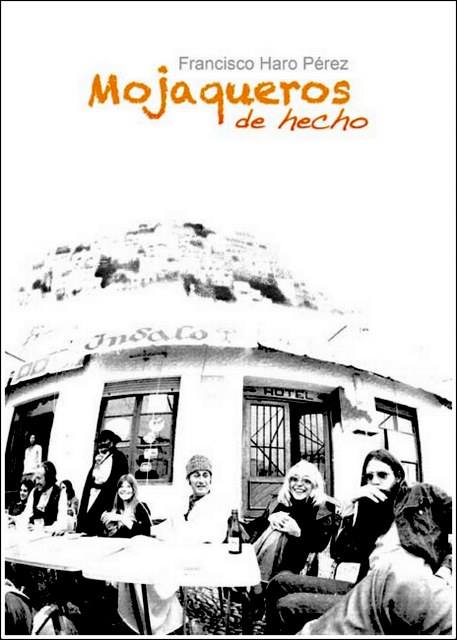The Bookshelf
Sunday, February 1, 2026
I was sorting through some old books of mine found in a few boxes in the attic and came across a handful I just knew the local English Library would kill to get their hands on. Treasures like ‘Fodor’s Amsterdam 1957’, 'Maigret's Second to Last Case' and a virgin copy of ‘Teach Yourself Swahili’.
At the bottom, hidden under the ‘Collected Works of Alistair MacLean’s Greatest Poems’, I found a peculiar scientific magazine about pets, or rather: ‘Anthrozoös – A Multidisciplinary Journal of the Interactions of People, Animals and Nature’.
Where on earth did that come from?
The library was closed for the day, giving me a chance to dive into the mag, thirty years old this month. All a bit beyond me, although I found an article about cockfighting – a pastime apparently still legal in Jeréz de la Frontera.
Another book, and I’ll keep this one, has seventy-five front pages of Almería newspapers courtesy of the Almería Press Association.
One of the newspapers featured was mine: ‘The Entertainer’ (if you remember it). 
I found another treasure: ‘Mi Mamá me Mima’ – a book about how Spanish women were treated during the Franco years (Spoiler: not good), with useful tips about cleaning the kitchen and so on.
In reality though, once I’ve dusted off all the classics, the dictionaries and the Latin primers, and put them lovingly either in the trash or aside for the Chief Librarian to worry about, I turn with more interest to the large remainder.
See, I’m more of a thriller reader.
Spy stories are good, plus bug-eyed monster books and the better detective yarns. By now, I've read over seven thousand of them I reckon (apart from War and Peace, which took a month, I can usually get through two or three books a week).
When we first moved to Spain, before the Age of Television, my dad shipped half a ton of novels to keep us (and a number of English-speaking neighbours) amused. It was hard finding shops that catered for the English reader back then. There was one shop in Granada which had a shelf of very old paperbacks – probably printed in the fifties – and a couple of second-hand places in far off Torremolinos on one side, and Benidorm on the other. So not much to be going on with unless you brought your own with you (or fancied a merry weekend in T-Town).
I was an unwilling student in England in those tender days of the second half of the sixties and was a keen reader (there wasn’t much else to do at my school). So, with a suitcase full of books, records and teabags, I would be welcomed three times a year by my parents (or one of their friends if there was a party going on) at the Almería airport.
My bookcase, or rather, my several bookcases, are full of treasures and as I get older and more forgetful, I discover, ruefully, that I can read them all over again.
As for an electric book, a Kindle (with a thousand books stored therein), I think it would look a bit silly and self-conscious leaning against the wall all by itself on an otherwise naked bookshelf.
I still prefer books to the soulless TV, which now – for a small consideration – brings you shows in your own language (one might never know that the neighbours are Spanish).
These days, I can’t afford new books in English (where available) and don’t approve of Amazon, so the second-hand or charity shops (we have at least eight within a ten-minute drive) keep me happy enough, four for a euro.
And then, there’s the library. They say they will accept books in good condition but are probably thinking of someone bringing in just two or three. They have a fine collection, it must be said, and I’m a keen member (also – it’s nice to talk with the volunteer librarians about books).
I brought them four boxes-worth last week.
I was wondering though: the English Library still doesn’t have a computer, using instead a card-filing system; but one day, in the far future, I suppose one could just download one’s reading matter via the Internet onto one’s trusty Kindle – leaving me and many like me with no one to talk to.
 1
Like
Published at 2:30 PM Comments (5)
1
Like
Published at 2:30 PM Comments (5)
Regional Elections in Spain
Monday, January 26, 2026
There are seventeen autonomous regions in Spain (plus the two autonomous cities of Melilla and Ceuta). Some of these regions are large: Andalucía comprises eight provinces, Castilla y León has nine, and others are small – such as Madrid, La Rioja, Murcia plus another four, which are all uni-provincial.
Each region has its own government and president.
Right now, we are in election mode in some of the autonomies (every four years unless called before). Extremadura with two provinces just had theirs in December – although the problem in the capital, Mérida, arises with the third party, Vox, insisting on various functions within the minority government of María Guadiola (PP) in exchange for their support. 
The final outcome remains unclear – and Extremadura could soon be called to the polls again.
Aragón is controlled by the PP and is currently in campaign mode for February 8th. It looks like Jorge Azcón will be returned, but as above, will need the support of a revitalised Vox. The Vox candidate Alejando Nolasco is a little extreme, describing the regional PP as ‘pro Islam’, according to one of the local news-sites.
Meanwhile, the candidacy of a PSOE government minister, Pilar Alegría, probably won’t be of much help for the party’s chances. The far-left once again refuses to join together (a bit like the Life of Brian’s joke of the antipathy between the People’s Front of Judea and the Judean People’s Front). Thus: IU and Sumar on the one hand, la Chunta Aragonesista on the other and Podemos bringing up the rear.
Aragón is three provinces, with its capital in Zaragoza.
The next up – for March 15th – is another PP stronghold, with Alfonso Fernández Mañueco (PP) holding the keys to Castilla y León. His problem might be the disastrous summer fires throughout the region, badly mismanaged by Mañueco and his team. Nevertheless, he will likely win say the experts (with the support or otherwise of Vox). The capital of this, the largest region of Spain with nine provinces (although the three western provinces of León, Salamanca and Zamora all want to leave) is Valladolid.
Finally, we come to Andalucía – yet again held by the PP. The president is Juanma Moreno and is seen as one of the two leading candidates (along with Madrid’s Ayuso) to take over the party nationally when Feijóo throws in the towel. The PSOE candidate is the heavyweight María Jesus Montero, the current Minister for Hacienda and vice-president of Spain. The date is sometime in June.
There could be the chance of an early surprise general election on the same day as the Andalusian ballot – depending on events and Pedro Sánchez.
In all these regions – as indeed elsewhere – the key to the throne-room appears to be in the hands of Santiago Abascal’s Vox party. In an uncomfortable alliance with the PP (which must make allowances and exceptions), Spain is approaching a difficult time.
 1
Like
Published at 9:53 AM Comments (3)
1
Like
Published at 9:53 AM Comments (3)
A Walk Down Memory Lane
Sunday, January 18, 2026
I’m not sure if they did table-service back then, I’ll have to ask Haro’s son Paco when I see him. ‘Let’s see, two gin and tonics, three wines, a beer and a Fanta Orange’ (the last one being for me). I'm pretty sure you had to walk up to the bar and place your order.
In those days, back in the late sixties, there wasn’t much else to do for my parents and their friends beyond gossip and drink while seated around the rickety tables of the Hotel Indalo in the square. There was no TV, no newspapers and few interruptions beyond…
‘Napia, gimme a duro’, said a dishevelled local fellow called Antonio: the price of a brandy.
My dad would hand over the five peseta coin and Antonio would totter into the bar for his reward.
Oddly, the word Napia (my family name is Napier) would raise chuckles among the local folk. Everybody had a nickname (important when there are seventeen people called Paco working in the town hall) and napia means in Spanish a beak, a hooter, a conk, a schnozz – in short, a large nose. This happened to be a feature of my father’s appearance, along with being very tall, red-headed, and covered with so many freckles that they always looked like they might one day decide to join together.
He was also known as El Langostino.
My parents had already decided to leave the UK and move to somewhere odd, when a family friend suggested Mojácar: a falling-down white village in the forgotten province of Almería with a view of the sea and just the one cheap hotel (60 pesetas a night). They arrived in the summer of 1966, just a few months after the bombs fell from the stricken USAF B-52 over the nearby village of Palomares.
I was at boarding school and didn’t make it over to Spain until the following year. 
A couple of the people regularly gathered around the tables on the terrace were something to do with the Americans – one of them was rumoured to be in the CIA and another had worked ‘for Uncle Sam’ installing a desalination plant over the site of one of the fallen bombs as a sop towards an outraged Franco (it was quickly dismantled after the Americans left and sold for scrap). The engineer deciding to stay and open the village’s first beach bar.
There were a couple of London wide-boys, a few artists, some gays, an Olympic skier gone to seed, a dance instructress who had been in the French resistance, a Danish fellow with a handlebar moustache who spoke better English than Terry Thomas (who he strongly resembled), an air-vice marshal with a plummy accent, an American draft-dodger (Vietnam), two or three piednoirs (Franco didn’t allow work-permits, but French Algerians were excepted), and a revolving number of others who came and went as circumstances allowed.
If they all enjoyed a few jars, the odd libation, a nip or two, a gargle and a swally, the only sober one at these sessions would be me. I was thirteen when I first came to Mojácar, and I maybe smoked a bit – but I had no interest in booze, and the one time I tried I was sick all over my father.
Smoking though. Everybody smoked. It was so cheap back then – a packet cost between five and twelve pesetas (three to seven cents of a euro) with the only problem being that this was black tobacco, grown I think in Extremadura. Far rougher than Virginia.
Not an issue of course – everyone in those times smoked Ducados or Celtas.
Even Antonio, the moocher.
The hotelier’s son, about my age, grew up as one does and wrote a book a few years ago. It was a homage to those early foreigners who had stayed either in the hotel or slept in the foyer. He kindly called his tome: The Made Mojaqueros.
 5
Like
Published at 9:41 PM Comments (1)
5
Like
Published at 9:41 PM Comments (1)
Who's Side is he on Anyway?
Tuesday, January 13, 2026
No matter what is going on in Spain or around the world, it’s hard to not turn and look over one’s shoulder a couple of times each and every day at the terrifying antics of America’s leaders: Trump and his motley crew of whack-jobs.
Few of us here in Europe will identify themselves with his supporters. The left and centre certainly don’t, and Marine Le Pen, the French fascist leader, says she thinks he’s crazy. But of course, here in Spain we have Feijóo and Abascal, who appear to like anything that the Government doesn’t, and look for approval and support from wherever they can find it.
Venezuela has long been a topic for the right-wing in Spain. How not to run a country and so on – a short step for identifying the current Government here with the ghastly mess that comes from that unfortunate Latin American state, now under the firm control of the USA.
I think it started with the story – invented by the Spanish so-called ‘Patriotic Police’ – of how Podemos was financed by Caracas: a most successful smear which pretty much did for the party.
‘Right-wing Spanish politicians often bring up Venezuela to criticize the left for a mix of political strategy, symbolic comparison, and historical context. Indeed, analysts describe Venezuela as a sort of handy excuse for the Spanish right to attack any appropriate position on the left’ says Google.
Unfortunately – Trump decided, following his extraction of Nicolás Maduro – to leave the Chavista government in place rather than turning things over to the opposition (and the Nobel peace prize winner María Corina Machado). Who cares – he just wants the oil as he himself says. It also appears, to the dismay of Spanish conservatives, that Maduro’s membership of the fabled Cartel de los Soles was purely an American invention.
The PP and Vox, their noses rather out of joint, must now (with the rest of us) contemplate further possible Trumpian attacks on Colombia, Cuba, Mexico and Greenland. Hell, maybe Canada too: most of this malarkey, mind, devised in the last ten days as The Donald apparently goes rogue. 
He’s only got until the mid-term elections next November (plus his ailing health) to lock everything into place.
All of this would mean the irreparable break-down of Nato.
Then there’s Iran – which come to think of it probably deserves a little tender American lovin’.
Back in Small Town USA, the same people who claim the woman killed in Minneapolis was a domestic terrorist are telling us that the people who stormed the Capitol are heroes. In fact, a Trumper friend writes and compares the killing to the shooting of a woman involved in the January 6th 2021 mob attack on the Capitol in Washington, following the Dear Leader’s complaint that the results of the 2020 election were rigged.
And thus we ‘live in interesting times’; and wonder guiltily how our children and grandchildren are going to manage in the next years and decades.
I think on balance, we oldies had it pretty good.
...
PS, I couldn't bring myself to capitalise the word 'he' in the title - it's bad enough that he thinks he's a king...
 5
Like
Published at 12:58 PM Comments (10)
5
Like
Published at 12:58 PM Comments (10)
Rain and Shine
Tuesday, January 6, 2026
It’s been raining a lot recently. I am sure that the ground could do with a good soaking, and the wild-flowers later this month and next will no doubt be spectacular. But for those of us who live under a flat roof (as most of us do in Almería) the first thing after the pitter-patter coming from sound above our heads (unless it’s the cat) is to put out a few buckets in the living room, move the bed a bit to the right and tie a knot in our handkerchief to remember to see about fixing the leaks once the sun returns. 
Or, failing that, before next winter anyway.
We never think much about rain down here in the south, although flooding both on the Costa del Sol and the Costa Blanca can be mortal (229 people died in the Dana in October 2024 in Valencia). Sometimes houses near where I live get inundated, especially in those areas which are listed both as flood-planes and urbanisable by whoever makes these calls.
My friend Chicho would tell a story of how he was sitting under an umbrella in his lounge watching water dribble through a crack in the window one wet afternoon when the local lagoon breached and a tide of water smashed through the glass and drenched the poor guy.
In most of Spain, a river is a river, or at least a stream. It will fill up when the rains come, maybe overflow and cause damage to the roads and nearby houses; but here in the dry south we don’t have rivers – we have ramblas, which are in effect, huge drains waiting for their moment of glory.
Along comes Storm Francis: Frank to his friends. The various costas are duly flooded and the journalists are to be found, standing in their wellies and speaking into the cameras. It’s the usual television cliché, like when they show snowballers after a good arctic storm.
Right now, I’m home safe, dry and warm. I have a couple of large tins of pork in a German sauce, courtesy of Aldi and my own planning ahead, a bottle of gin and some tea. I’ll be fine. I’m also isolated, surrounded by a lake as our dry river has filled and overflowed into my grateful orchard. The thing about the river-beds is that they can suddenly fill with water as a wave comes from up-stream. It’s not here that the rain needs to be watched, so much us up there. A decent wadi can fill in no time at all.
It will be a couple of days before I can get out and go shopping.
Actually, having written that, I see that I panicked needlessly, and the road is still there.
So: lessons. First of all, build your dream home on a small hill. It’s good for your tubes.
Second, if you are going to have a flat roof (and our local ordinance insists that you must), then make sure it’s leakproof.
Thirdly, buy a couple of those German emergency K-rations – mine are good until 2028.
 3
Like
Published at 1:43 PM Comments (1)
3
Like
Published at 1:43 PM Comments (1)
If Today is Saturday, This Must be Venezuela
Saturday, January 3, 2026
A remarkable story on Saturday, as Donald Trump’s soldiers attacked several Venezuelan military bases while his Special Forces (in a breathtakingly professional operation) managed to bag the president of that country and his wife Cilia to take them to some location in the USA – later revealed as a detention centre in up-state New York. The Pentagon said that Maduro will be judged for criminal offences and that the attacks on the country would cease. 
Give them their due – it was a slick operation.
The whole enterprise was a bit similar to Putin’s 2022 attack on Ukraine, the buildup of forces on the frontier and so on, but evidently turned out to be rather more successful. Will China feel that it’s their turn now with Taiwan? We shall see.
My son, who lives in the Midwest, can now expect cheaper petrol at the gas-station, and will thereby appreciate that at least one of the Presidential promises has been fulfilled.
Aljazeera has ‘Maduro joins Iraq’s Saddam, Panama’s Noriega as latest leader taken by US’. Reuters posted: The Russian Foreign Ministry called the U.S. strike on Venezuela "deeply concerning and condemnable", and from Argentina’s President Milei, "Freedom moves forward, hooray for freedom Goddammit’.
Spain’s reaction to this remarkable coup understandably varied from left to right. President Sánchez calls for a de-escalation – he says: “Both International law and the principles of the Charter of the United Nations must be respected”. Pedro Sánchez, in line with the EU, avoided expressly condemning the US operation, while Sumar denounced the attacks against Venezuela as “imperialist aggression. Alberto Núñez Feijóo meanwhile was insisting on a quick transition led by Edmundo González (the doddery old fellow who lives in exile in Madrid).
Feijóo and the Partido Popular were quick to congratulate themselves on Maduro's kidnapping, assuming it signalled the beginning of Machado's return to Venezuela, as well as Edmundo González's. They must have been livid when they saw Trump constantly referring to oil as one of his priorities.
The ex-Podemos leader Pablo Iglesias didn't mince his words after the attacks in Venezuela: "They're bombing to steal their oil and impose a puppet government."
Gabriel Rufián (ERC spokesperson) says "Bombing another country is not war, it's aggression, and detaining the President of that country is not an arrest, it's a kidnapping."
We read at El Mundo that Maduro will be tried for ‘narcoterrorism and possessing destructive arms against the USA’. (We are reminded that the ex-president of Honduras Juan Orlando Hernández was recently pardoned by Trump after being jailed for the export of 400 tons of cocaine to America).
The American vice-president JD Vance tweeted: “The president offered multiple off-ramps, but was very clear throughout this process: the drug trafficking must stop, and the stolen oil must be returned to the United States. Maduro is the newest person to find out that President Trump means what he says."
Although Secretary of State Marco Rubio tried to emphasize that the attack and extraction of Maduro and Flores were a law enforcement mission, Trump made it clear the goal was regime change in order to gain control of Venezuela’s oil. The administration acted unilaterally, without consulting Congress, and in apparent violation of international law.
Around 600,000 Venezuelans live in Spain, many in the smartest barrios in Madrid. No doubt, those wealthy expatriates having managed to get their money out of Caracas and safely invested in real-estate, they would be pleased by the events. Indeed, we see on the TV that a large Venezuelan celebration was held in Madrid on Saturday afternoon ‘supported by both the PP and Vox’. "I thought the Americans would solve this in a day at most, but if it's true that they captured Maduro in just three hours... that's a whole different ballgame", said one celebrant.
…
‘An assault not seen since World War II’ said Donald Trump in a live speech on Saturday afternoon (Spanish time) in a babbling monologue as he veered off-topic more than once to discuss things like the National Guard presence in various US cities. Perhaps you saw it.
“They took our oil infrastructure. We never had a president who did anything about it”, he said, with a nudge against the former president.
“We are going to run the country until the arrival of a proper turnover of power”, he said.
“The oil business – we’re going to have our large American companies fix the infrastructure, and we are ready for a second, much larger attack if necessary”. Mario Rubio standing beside him looked faintly embarrassed.
“National security, just like tariffs – make our country rich” said The Donald.
“A year ago, we were a dead country, no longer”, said Trump, unerringly alienating half of the American population once again.
Following his speech, we heard from his senior advisers.
Secretary of State Marco Rubio: ‘Don’t play games with this president, because it won’t turn out well’.
‘We showed Guts, grit, gallantry and glory’, said Defence Secretary Hegseth in an alliterative moment.
‘A rather extraordinary press briefing’ said the BBC journalist following the event.
The Guardian covered the Mar-a-Lago speeches here.
…
The opposition leader (and Nobel Peace Prize winner) Maria Corina Machado speaking from an undisclosed site (probably in Miami): “The time of freedom has arrived, and we are ready to take power”. However, 20Minutos reports that Trump has ruled out María Corina Machado to lead Venezuela: "She doesn't have the internal support or the respect of the country", says Trump. Instead, the President has chosen a hostile (Maduro’s vice-president) Delcy Rodríguez to take over.
The pundit Chris Hedges writes: ‘The kidnapping of Venezuelan president Nicolás Maduro and his wife solidifies America’s role as a gangster state. Violence does not generate peace. It generates violence. The immolation of international and humanitarian law, as the U.S. and Israel have done in Gaza, and as took place in Caracas, generates a world without laws, a world of failed states, warlords, rouge imperial powers and perpetual violence and chaos…’
Hedges returned to his attack on Monday: '...Trump governs by imperial decree through Executive Orders. The media, owned by corporations and oligarchs, from Jeff Bezos to Larry Ellison, is an echo chamber for the crimes of state, including the ongoing genocide of Palestinians, attacks on Iran, Yemen and Venezula, and the pillage by the billionaire class. Our money-saturated elections are a burlesque. The diplomatic corps, tasked with negotiating treaties and agreements, preventing war and building alliances, has been dismantled'.
From The Other 98%, we read: ‘Let’s strip away the euphemisms: this is invasion, not enforcement. There was no imminent threat to American soil that justified the use of force under international law. Venezuela sits on some of the largest proven oil reserves in the world, and its economic and geopolitical position has long made it a target of U.S. political and economic pressure’.
The surgical strike that caught Maduro on Saturday morning was - it turns out - not entirely bloodless with members of the palace guard being (as the Israelis like to say) neutralised. Around eighty died here and there, including some Cuban soldiers.
Later: A few other reactions. The Venezuelan Attorney General condemned the "cowardly imperial attack" against civilians in Venezuela. He also demanded the release of President Nicolás Maduro and his wife.
Brazil's president denounces the "unacceptable" US attack and the capture of Maduro. Lula da Silva warns that it paves the way for a world where "the law of the strongest" prevails.
A Chinese Foreign Ministry spokesperson on Saturday said China is deeply shocked by and strongly condemns the U.S. blatant use of force against a sovereign state and action against its president.
The far-right French politician Marine Le Pen criticizes US attack on Venezuela.
The parody site El Mundo Today says Europe is losing patience with the United States and is seriously threatening to issue a statement. “It will be partly in capital letters,” thundered Von der Leyen.
Finally, Trump issues a stark warning to Colombia's Gustavo Petro: he asserts that Petro will be the next US target after Maduro.
 1
Like
Published at 7:29 PM Comments (1)
1
Like
Published at 7:29 PM Comments (1)
New Year Revolutions
Wednesday, December 31, 2025
Gracious me, I’ve been posting articles here at Eye on Spain more or less weekly since October 2020: most of which come from editorials and content for a news bulletin I send out to subscribers called Business over Tapas since January 2013. Some of them political, others useful, and then there were a few comic ones too.
Right now, it’s a fresh new year and hopefully our friends Bibi, Donnie and Vlad (and various others, needless to say) will make appropriate resolutions to reign in their evident enthusiasm for death and destruction.
Here in Spain, we see that none of our political parties are doing particularly well, with scandals emerging from the woodwork: normal I suppose when one is in the public eye for a spell.
I think Feijóo will be the first to go, but we shall see.

I was in Granada over Christmas, staying with the in-laws. On the Thursday, Christmas Day, a group of fourteen of us from three generations found ourselves enjoying a noisy lunch in a gigantic hanger of a restaurant located in the suburbs and filled with families. Me and the Spanish granddad, both of us stone deaf, smiling and winking gamely at each other over the fish as the rest of the comensales helped to contribute to the ambient cacophony.
Granada remains my favourite city, and I am glad that one of my American granddaughters will be moving there to study from this Easter. This will give me the perfect excuse to drive up the motorway now and again to visit.
New Year’s Eve in a noisy affair here on the coast, with fireworks, the regular explosion of champagne corks and an occasional screech as someone is pushed fully dressed into the pool.
The best place for me to be on these merry occasions is safely in bed with a good book.
My best wishes to all this New Year.
 1
Like
Published at 11:16 AM Comments (2)
1
Like
Published at 11:16 AM Comments (2)
Antifa Antidote
Saturday, December 20, 2025
From CBS News: What is Antifa? ‘In the USA, the right-wing media blames antifa members for rioting and looting. Democrats have also condemned such violence, but many on the left say the rhetoric about antifa (i.e., anti-fascist) is greatly exaggerated, and that it's less of an organized movement than just something of "an idea."
Swiss Info says: ‘Antifa, designated by US President Donald Trump as a "domestic terrorist organization," is a diffuse "anti-fascist" movement of left-wing activists that experts say is more of a political ideology than an organized group…’ We read: ‘Antifa, from the word anti-fascism, was already in use in Germany in the early 1930s, where "anti-fa" socialist groups tried to oppose the rise of Adolf Hitler's Nazis…’ 
For some reason, perhaps to escape the obvious point that our fathers and grandfathers fought, precisely, against fascism in the 1940s, the American right pronounces it ‘antee-fuh’ rather than ‘anti-fah’!
But much of what politicians say about antifa isn't quite true. Here's what antifa is and what it isn't.
Antifa is not a highly organized movement, nor is it merely an idea. Antifa is a loose affiliation of local activists scattered across the United States and a few other countries.
‘In general, people who identify as antifa are known not for what they support, but what they oppose: Fascism, nationalism, far-right ideologies, white supremacy, authoritarianism, racism, homophobia and xenophobia…’
Flag shaggers, antifeminists and fake-news merchants.
Some of us don’t like cockroaches either.
Here in Spain (where no one had ever heard of it until now) La Razón recently ran a piece titled ‘Antifa: the masked figures who want to stifle public debate. The United States is pushing to outlaw them, Spain to welcome them’.
Apparently, if you believe La Razón, which you most certainly shouldn’t, the country is swarming with them. The Spanish ABC posted in October: ‘Trump orders foreign anti-fascists to be designated as terrorist groups. A Trump advisor tells him to look at who belongs to these groups in Spain’.
No one - is the short answer to that, because it’s an opinion rather than an entity. 
Nevertheless, because it’s worth a shot, the Trump-admirer Santiago Abascal, the leader of Vox, has recently called for antifa to be declared as a terrorist organisation in Spain: the proposal to be debated in the National Parliament in February.
Perhaps, on sober reflection, what we really need to do is to ban the anti-antifa program.
And so we come to 'Polarisation'.
According to Google AI, ‘Political polarization is the growing ideological gap where political groups and individuals move away from moderate views towards extreme ends of the spectrum, creating deep divisions, increased hostility, and difficulty finding common ground…’ 20Minutos says ‘The scar of polarization: five million Spanish people have broken with family or friends due to political motives’. Their recent questionnaire asks if it’s happened to you. And then along comes Campofrío (the ham people) with their Christmas advert: Let’s get together and bury our differences (video)…
(I think they could have maybe dropped Ana Rosa Quintana from the advert).
I suppose - as Vox appears to be gaining support - my main worry is this:
Is Ol’ Santi planning a Spanish version of ICE (the United States Immigration and Customs Enforcement) where lump-heads get to wear combat gear and a mask as they round up anyone who looks like he didn’t come over in the Mayflower; maybe make it a more Spanish version, something like Franco himself would have approved of?
He'll need the approval of whoever will be running the PP when Spain next goes to the polls.
 1
Like
Published at 3:17 PM Comments (11)
1
Like
Published at 3:17 PM Comments (11)
Shopping for Food: the Early Days
Sunday, December 14, 2025
I’m writing this while sipping on a Marzipan brandy, a slightly peculiar cordial that comes in a tall and skinny bottle from the local Aldi supermarket.
It makes me think of the old days, when one’s Christmas preference was a bottle of El Gaitero, a sweet cider which is sold in a champagne bottle – because the *pop* as the cork is released is an important part of the seasonal celebration.
Also, it was cheap – indeed, it still is.
Good too, even when you’re drinking alone.
Long before they built an Aldi on the other side of the hill from where I’m living, my parents would have to take the cuatro latas (as the Renault 4s were known) along the coast to our market town – Vera – which in the early seventies had opened the area’s first supermarket: Emilio’s – which I am glad to see is still going, fifty years later. You could wander around and push exciting stuff into your basket: ‘impulse shopping’ had arrived (‘What on earth is this?’ my mother might ask as she eyed something new).
Locally, we had a few groceries. The best known was in the village square: Juana’s place. She ran the shop – you would point at the shelves and say in your best Spanish ‘uno por favor’, continuing until you (and Juana) were content. Later, and Juana would catch on fast to her new market, she nailed a sign outside the store which read ‘Foodings’. 
There was a fellow known as Tea-cosy Roger who lived in the back of the village, and one could drop by to ask him to pick up this or that in Almería (an hour and a half away) where he would go on the bus once a week. He always wore a colourful woolly hat, obviously knitted by his adoring mum. His front room had a single tin of mock-turtle soup on a shelf to underline his commercial spirit.
Later, a local eccentric called Ian would offer an even more interesting service – driving up now and then to a suburb of Benidorm in his BMW and trailer to pick up British sausages and other goodies, to be mobbed on his triumphant return.
Supplies also arrived by air, as friends flying out from the UK remembered to bring bacon and teabags mixed in with their luggage.
A shop in the local port of Garrucha would regularly be talked into ordering strange products by a salesman that only a foreigner could possibly like. Diego would mournfully say as I enthusiastically picked up his final carton of johannisbeersaft, ‘Well, thank God that’s gone, I’m never buying that again’. Next week, he’d have a special on Irish butter biscuits.
For proper meat, my parents would drive down to the nearest decent butcher, a German in Torremolinos. This would take several days for one reason and another.
And thus, we survived. The local milk came in a tall returnable bottle fitted with a metal bottle top (like a beer). It was slightly blue in colour thanks to the added formaldehyde. On the bright side, it never 'went off'. Butter came in a tin from Belgium. Pork, goat, chicken and eggs were easy to find in the local markets. When the fridges began to appear in the shops, we found Spain’s excellent yoghurts and ice-creams – although the milk would take a little longer to arrive, waiting for the twin inventions of UHT and Swedish tetra-brik packaging.
Simple times. One paid in pesetas and got one’s change either in small coins or sweets.
But these days, as our area shyly joins the 21st Century, we can now lay claim to several small supermarkets and four large ones, including the recently opened Aldi.
They are all playing Christmas music in their stores right now, which sort of explains how I ended up with a bottle of Marzipan brandy.
 3
Like
Published at 12:48 PM Comments (2)
3
Like
Published at 12:48 PM Comments (2)
Dividing up the Territories
Tuesday, December 9, 2025
I made a little joke the other day and put it on Facebook. Contemplating my mortality, I noted that I was nevertheless younger than Trump, Bibi and Putin (at 79, 76 and 73 respectively), and with a bit of luck, would outlive the three of them. Although, it’s true that they probably enjoy better medical attention than I do.
None of the three above-mentioned gentlemen appear to have any love for Spain. 
I’ll leave it to The Gentle Reader to agree or disagree about those three leaders – and perhaps a few others (Kim Jong Un springs to mind) who are jostling for position behind them for the Planetary Ogre Awards – and attempt instead to focus here on their enmity with Spain and indeed Europe.
Let’s see: Donald Trump is annoyed with Spain for not leading the re-armament of Nato, for failing to buy enough American military hardware and for letting in too many immigrants – particularly those of the coloured persuasion.
Bibi Netanyahu is crushed over our negative reaction to his country’s unwelcome presence in Eurovision, the issues over the Tour de España this past summer and also our unremitting anger against his genocidal activities in Palestine.
Vladimir Putin simply doesn’t like any country that backs Ukraine and he has threatened Europe with a ‘if you want war, I’ll give you war’. A nasty piece of work in my opinion.
As for his current occupation of as much of the Ukraine as he can obtain, it doesn’t appear that Donald Trump is as concerned as one might hope, as the recent American plan for the next two decades seems to suggest that they will be busy with their own back-yard, if one can so describe Venezuela and Columbia (and don’t forget Greenland), leaving Russia free to snaffle up bits of the old Soviet Union and presumably, allow Xi to absorb the lost province of Formosa, currently called Taiwan.
Meanwhile, the surviving bits of Europe can go play with our rigorously attached plastic bottle-caps.
Russia, too, is especially keen in manipulating the voting system in other countries to help the far-right, or (as in Catalonia in 2017) to divide the Europeans in any way that they can.
All these autocracies are actively trying to change our minds about this and that and they use fake-news, distortions, legions of preppy influencers, ample funding and false narratives to do so.
Europe, it would appear, has been having it too good, and we need to buckle down to the lofty ideals of our billionaires and pay more in taxes, take out private health insurance and keep working into our eighties.
We read that the Trump administration has just released its National Security Strategy, the blueprint for the next two decades. Trump, it appears, is against the influence of multilateralism – whether the United Nations, Nato or the European Union. ‘In recent days, the level of aggression against Brussels has reached an unprecedented level. Before, there have been many veiled attacks and insults, with malicious and condescending remarks, but now we are facing a full-blown assault, without any attempt at retraction, on the leadership and unity of Europe, because a divided bloc, where Euroscepticism grows, is better for them, just as it is for Russia. This way, we will be weak, and that leads to capitulation’, says El Huff Post.
That document announced the U.S. will back away from the global alliances formed in the wake of World War II and calls for making sure Nato, the organization that has opposed first Soviet and now Russian aggression since 1949, doesn’t continue to expand (so much for the Ukraine). The administration’s document calls for a world dominated not by a rules-based international order in which countries must respect each other’s sovereignty, but by a few major powers that control weaker nations in their sphere of influence.
The document also warns about Europe becoming less white, or as Trump says “Europe is facing the disappearance of its civilization” (unless we knuckle down). The BBC adds: at the same time ‘…the document hails the growing influence of "patriotic European parties" and says "America encourages its political allies in Europe to promote this revival of spirit".
"We want Europe to remain European," says the American plan. In a sort of far-right, anti-immigrant way.
And then there’s Elon Musk who is currently calling to 'Abolish the EU', for his own commercial reasons.
Russian officials appear to be happy with this U.S. foreign policy, and we read that ‘The Kremlin on Sunday welcomed US President Donald Trump’s move to stop calling Russia a direct threat and said his new national security strategy, which portrays European powers as in decline, largely accorded with Russia’s own perceptions’.
In short, it appears that a still disunited Europe is either on its own or must cozy up to the Chinese.
As the aggressive foreign powers attack us through fake-news, manufactured guilt, the Internet and Hollywood, we can only reply with our softer version of spreading our own culture through the Instituto Cervantes, the British Institute, the Goethe-Institut and so on.
Pedro Sánchez is one of our better statesmen, and he said in Los Cortes this Saturday during the celebrations of the anniversary of the Spanish Constitution that “Europe will never be under the tutelage of anyone, nor will it be a vassal of any political power or any national power from other geographical latitudes”. On Monday, the President of the European Council, António Costa, stated that the European Union would not accept any "threat of interference in European political life". He also referred to the U.S. document’s text which criticizes the "regulatory suffocation" of the European Commission.
Meanwhile, as Trump joyously received the FIFA’s peace prize, Pedro Sánchez was awarded the Mario Benedetti International Prize for the Fight for Human Rights and Solidarity 2025, an award he shares with the UN Special Rapporteur for the occupied Palestinian territories, Francesca Albanese.
Now, if we could just resolve the Ukraine issue in a sensible way.
 1
Like
Published at 6:20 PM Comments (9)
1
Like
Published at 6:20 PM Comments (9)
Spam post or Abuse? Please let us know
|
|